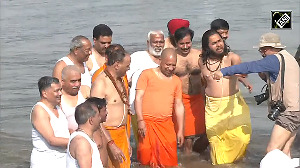 We present verbatim Prime Minister Manmohan Singh’s speech on the fourth anniversary of UPA II government, ahead of the dinner organised by the government to celebrate its achievements. The government also unveiled a Report Card on the occassion.
We present verbatim Prime Minister Manmohan Singh’s speech on the fourth anniversary of UPA II government, ahead of the dinner organised by the government to celebrate its achievements. The government also unveiled a Report Card on the occassion.
This Report to the People is the last before the next general elections. Next year, we will report to the people directly, seeking a renewed mandate. It is only appropriate that this year we take a longer term perspective and report to our people on what we have been able to achieve in these past nine years.
Before I proceed further, I would like to place on record our deep gratitude to Chairperson, UPA, Smt Sonia Gandhi whose inspiring leadership has made these achievements possible.
A detailed review of government programmes is contained in the Report and I urge all of you, especially the media, to read it fully. Let me focus today on four key achievements: one, the improved performance of the economy; two, making the growth process more inclusive; three, delivery of better governance and better delivery of welfare and development programmes; and, four, improved relations with a changing and challenging world.
Friends, we can legitimately claim, and with pride, that the UPA government has taken our country forward on all these four fronts in the nine years. We have journeyed many miles, though we know we have more miles ahead.
Let me begin with growth. Faster growth is necessary to provide expanding opportunities to our younger people and to generate revenues to support inclusiveness programmes. It is true that growth slowed down to 5 percent in 2012-13, but this was also a global phenomenon. GDP actually declined in the Eurozone. It grew very slowly in Japan and the U.S. It slowed down in China, and also other developing countries.
Last year the economy did slow down, but this slowdown is temporary. Taking a longer term view, we see that the India was among the fastest growing economies of the world with an average growth rate of 8 percent in the last nine years, including the years of slower growth. The NDA government delivered an average growth of only 5.7 percent during its six years in office.
Some of the slow down was due to external factors over which we have no control. It is also true that domestic problems had also arisen. These are being addressed. Many large investment projects are held up because of various regulatory clearances. A Cabinet Committee on Investment was set up to deal with this problem, and this is already yielding results.
The economic situation is turning around. Inflation is coming under control. The fiscal deficit is being brought under control. The current account deficit is high, but we will bring it down gradually.
We are confident that growth in 2013-14 will be better than 2012-13 and could exceed 6 percent. This will set the stage for trying to achieve the Twelfth Plan target of 8 percent growth for the five year period. This will be difficult, but it is not impossible. We have done it before, and if we receive a mandate next year, we will certainly achieve it again.
Let me now turn to the crucial aspect of inclusiveness.
Many people who are willing to concede that we have done a good job on growth, question our performance on inclusiveness. This is an important issue since our stated objective has always been that growth must be inclusive and must benefit the poor, especially in rural areas. I believe the UPA government has a good record in this dimension.
Agricultural growth is critical for prosperity in rural areas where most of the poor live. We achieved 3.7 percent growth per year in agriculture during the Eleventh Plan compared with only 2.4 percent in the Tenth Plan. We are targeting 4 percent in the Twelfth Plan, and I am confident we can do it. Our efforts at increasing food grain production are working as also our efforts to diversify agriculture. This is the foundation which allows us to introduce Food Security legislation in parliament.
Faster agricultural growth, combined with government programmes such as MGNREGA, and the expanded pace of investment in rural infrastructure have improved real wages of agricultural labour. Agricultural wages grew at 6.8 percent per year in real terms after 2004, which is six times faster than the rate of growth between 1994 and 2004.
The impact of our policies on rural prosperity can be seen from the fact that rural per capita consumption grew at 3.4 percent per year in real terms after 2004. This is four times faster than the growth rate of 0.85 percent observed in the earlier period.
The percentage of the population below the poverty line has also fallen much faster after 2004 than in the earlier period. I know many people feel that the official poverty line was too low, and an expert group has been set up to revise it. However, the conclusion that the percentage below the poverty line has fallen faster will apply even if the line is raised, provided the same line is applied in the base period.
Growth has also spread to the erstwhile backward states. The so called BIMARU states grew much faster in the Eleventh Plan than in earlier Plans.
Inclusiveness is not just about income and consumption. It also involves access to essential services such as health and education and skill development which directly improve the level of living of the weaker sections and also enable them to participate more fully in the growth process.
The report gives a detailed account of the UPA’s efforts in these areas through programmes such as the Sarva Shiksha Abhiyan, the Mid Day Meal Scheme, the ICDS, The National Rural Health Mission, the Janani Suraksha Yojana, the Rashtriya Swasthya Bima Yojana, the Skill Development Mission, etc.
I am happy to say that there is progress in all these areas. Primary school enrollment is near universal. Literacy has improved. The percentage of women accessing institutional delivery has increased. Polio has been wiped out.
These are important achievements. Of course public debate often focuses less on what has been achieved and more on whatever is still to be done. Where access has been provided, quality is still an issue and we need to push hard to address these issues satisfactorily. To our critics I would only say that in many of these areas since the glass was almost empty when we started, it will take some time before it is really full. The important point is that it is filling.
I must emphasise that success in this area depends critically upon the states. I should also add that experience varies across states and there are many states where very good progress is being made.
Let me now turn to the third area I had mentioned – governance and delivery of programmes. This covers a very wide field. It includes the assurance of safety and security for every citizen, including especially women. It includes the assurance that public services will be delivered upto specified standards and that redress can be demanded when this doesn’t happen. It includes freedom from delays and harassment which invariably breed graft and corruption and have to be got rid of. Finally, it includes elimination of corruption in the procurement and allocation decisions of government.
These weaknesses in governance erode trust and faith in government and we cannot, as a people, afford such an outcome. The problems are not new, nor are they unique to India. Indeed consciousness about these problems, and the demand to remedy them, has risen all over the world. This is especially so in democracies. We are the world’s largest democracy with a very free Press and an increasingly active civil society movement. These are our strengths. But they do put pressure for early and decisive action on all these fronts. This sometimes leads to impatience and hasty judgement.
Problems of governance have to be addressed by both the Centre and the States. The UPA Government has taken several steps which taken together are improving governance and accountability. The Right to Information Act has become a key instrument of empowerment of people. They now access information that reveals deficiencies and puts pressure on the system to take corrective steps. We have introduced the Lokpal Bill, which responds to a very wide demand for a more independent institution to probe allegations of corruption. We have introduced a Government Procurement Bill which will make the process of Government procurements and contracts much more transparent, thus reducing the opportunities for corruption. We have introduced a Land Acquisition and Rehabilitation Act to replace an old and highly unfair colonial legislation with a new Act which will be much fairer to those whose land is acquired.
Much is made of problems that arose with the way scarce resources such as spectrum and mining blocks were allocated in the past and there have been allegations of deliberate malfeasance. We have introduced more transparent systems for the future, i.e., auctions rather than relying on administrative allocations. The problems with past allocations are being dealt with, as they should be, under the Law. Allegations of impropriety are being investigated and cases of wrong doing will be punished. But we can claim credit that the root cause of the problem, which was the perceived non-transparency in the manner of allocation, has been addressed and these problems will not arise in the future.
Improving the quality of governance in a vast nation like ours is a major challenge. Both the Centre and the States have to act to deal with this problem. The UPA government has done more in this area than any other government.
Finally, I come to the fourth area, our relations with the world. More than two decades ago I said in Parliament that the rise of India as an economic powerhouse is an idea whose time had come. We have seen in these past nine years the full implication of that idea as India has engaged with the international community as the fastest growing democracy in the world.
Our improving economic performance and the talents of the Indian people have enabled us to build bridges with both developed and developing economies. We have deepened our relationship with the United States, Russia, and Europe. The initiative we took with the US on civil nuclear agreement has opened a new chapter in India’s technological development.
Our government has taken the lead in India’s active participation in the Asian community building process. India is today warmly welcomed to almost every important Asian and Asia-Pacific forum. India has increased its economic and security engagement with the Indian Ocean and the Indo-Pacific region. We have strengthened our economic and defence relations with countries of West Asia and the Middle East and of East and South-east Asia.
In our own immediate neighbourhood we have been able to manage some very difficult challenges to our bilateral relationships. Relations with China are showing our ability to manage difficult issues while working together in areas of convergence. I can say with some satisfaction that we have placed the South Asian Association for Regional Cooperation on firmer foundations. We have increased regional economic cooperation all around the Indian sub-continent.
What message does this experience of the past nine years convey to our young citizens who are about to enter their working life and have high expectations?
The central message is that the UPA government is working to realise your dream of an economically resurgent and socially just India. An India in which every citizen can expect to live a life of security and dignity with every opportunity to develop their own capacity to participate in and benefit from one of the great historical transformations that will take place over the next twenty years; the re-emergence of India as a major economic player in Asia and the World. This re-emergence will involve many transformations. It will involve transformations in the way government functions, shifts from agriculture to non agriculture, a rapid expansion in the manufacturing sector, a revolution in information and communications technology which will change both government and business processes, an expansion in the population in urban areas and a corresponding transformation in the way urban governments work.
It is an exciting transformation which will generate many stresses and strains. Under the inspiring leadership of Shrimati Sonia Gandhi, the UPA government is determined to bring about this transformation in a way in which all our people will benefit and participate.
Image: Prime Minister Manmohan Singh addressing a gathering during UPA II’s fourth anniversary dinner in New Delhi on Wednesday
Photograph courtesy: PIB











 © 2025
© 2025